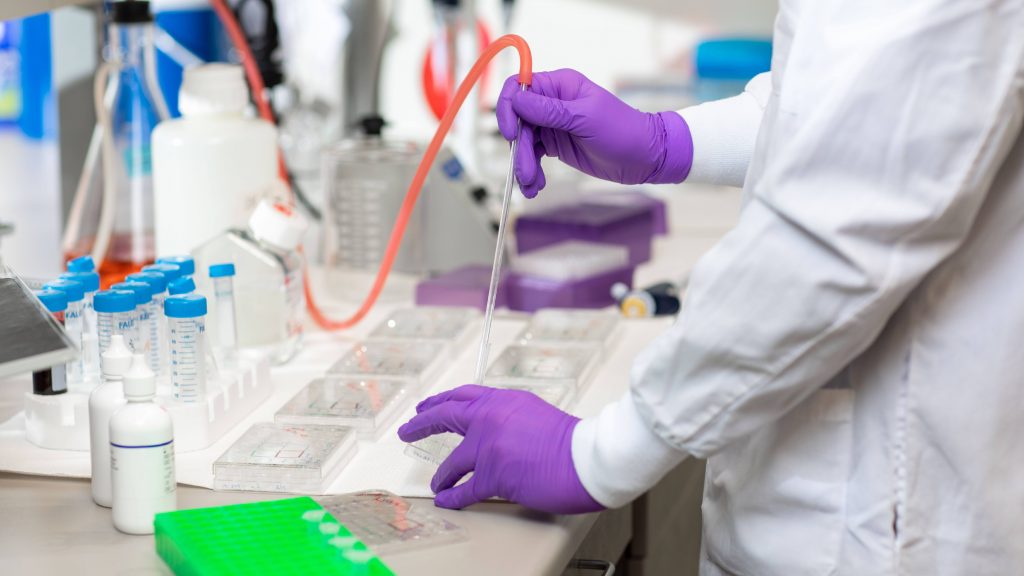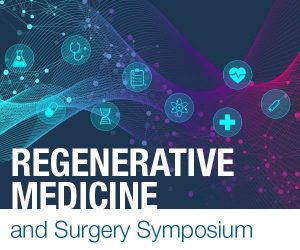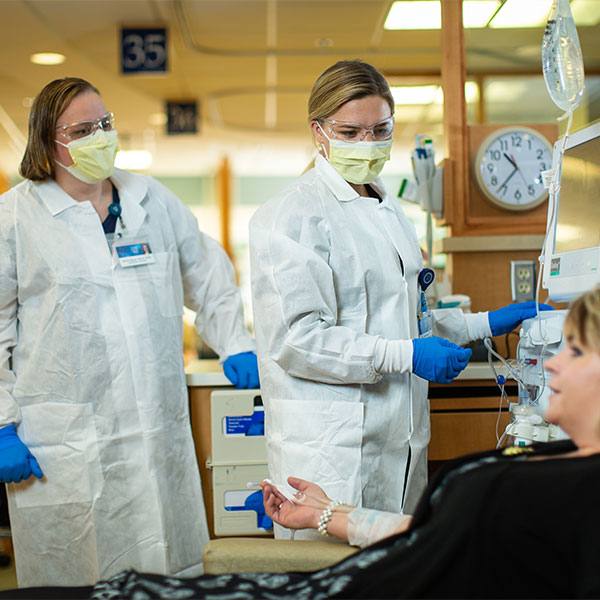-
Biotherapeutics
Mayo Clinic poised to biomanufacture a new era of regenerative therapeutics

ROCHESTER, Minn. — Mayo Clinic has launched a new biomanufacturing strategy that seeks to develop next-generation biotherapeutics that go beyond standard pharmaceuticals and deliver new cures for rare and complex conditions. The opportunities and challenges in this emerging field will be showcased at the Mayo Clinic Symposium on Regenerative Medicine & Surgery 2021, which will be held Nov. 4–7 at the JW Marriot Phoenix Desert Ridge Resort & Spa in Phoenix.

Julie Allickson, Ph.D., is an expert in biomanufacturing and the acceleration of promising therapeutic discoveries toward daily clinical care. Dr. Allickson is leading Mayo Clinic's biomanufacturing efforts to harness the power of biologics to produce first-of-their-kind therapeutics. Dr. Allickson is the Michael S. and Mary Sue Shannon Director of Mayo Clinic's Center for Regenerative Medicine and the Otto Bremer Trust Director, Biomanufacturing and Product Development, Center for Regenerative Medicine.
"Biomanufacturing really has to do with biologics, such as cells, genes or genetically engineered cells. Biologics are very complex, because of the variability of the product and lack of clinical grade supplies and reagents to manufacture," says Dr. Allickson. "Yet, biologics offer great opportunities for finding new personalized therapies for conditions that previously had no solutions."
Dr. Allickson has 25 years of expertise in regulatory affairs and clinical translation of cellular therapies. She has been an executive officer of a publicly traded company that builds services for cellular banking, including licensure of technology with several international affiliates. Her keynote address on future of regenerative medicine at the symposium will be followed by a panel discussion of regulatory issues in biomanufacturing.
The promise of a new era of regenerative therapies
Biologics are derived from living organisms, such as cells, which could provide these advantages over pharmaceuticals composed mainly of small molecule compounds:
- Biologics can be targeted more specifically to healing.
- They have potential for fewer adverse effects.
- Advances in technology enable large-scale manufacturing of biologics in a cost-effective manner.
"Biomanufacturing has the potential to bring forward biologics that not only affect the patient's quality of life, but also health care economics moving forward," says Dr. Allickson. "Using diabetes as an example: the cost of care is a huge burden socially and economically and in the U.S. is greater than 300 billion dollars. Finding a regenerative biotherapeutic would make a significant difference for patients. However, it will require a different type of expertise than we've seen with developing pharmaceuticals."
Cost of developing breakthrough therapies is often a key hurdle to commercialization. Biomanufacturing new products on site and accelerating these therapies with a multidisciplinary team, as executed at Mayo Clinic, will allow researchers to move discovery science to the bedside, especially in rare and complex disorders The clinical translation of biotherapeutics has the possibility of advancing new cures and reducing the overall cost of health care.
Opportunities for future therapies
Biomanufacturing is a growing field, with more than 1,000 developers worldwide in the field of regenerative medicine and advanced cell therapy. These companies are collaborating with medical centers such as Mayo Clinic to commercialize new regenerative therapies that can be used in daily patient care.
Dr. Allickson says the regulatory environment is favorable for advancing new biologics that address unmet patient needs. For example, the Food and Drug Administration (FDA) will grant its regenerative medicine advanced therapies designation to accelerate and streamline approval of gene, cell or tissue therapies for conditions with few therapeutic options.
"The FDA has provided clarity to investigators to understand what is required for regulatory approval for product development. The guidance from FDA has been extremely useful for investigators to advance to their discoveries to early phase clinical trials," says Dr. Allickson.
As a result, more regenerative therapies are being tested in clinical trials, including the first in-vivo gene editing clinical trial in the U.S for a rare disorder. Regenerative therapies are increasingly tested in phase 1 and 2 clinical trials for safety and effectiveness, with some therapies advancing to late-stage, phase 3 clinical trials.
Challenges in biomanufacturing
One of the challenges in biomanufacturing is having the proper technology and manufacturing facilities to meet rigorous quality and safety standards to secure FDA approval. Mayo Clinic is investing in Current Good Manufacturing Practices compliant facilities. New labs in the Center for Regenerative Medicine Advanced Biomanufacturing facility in One Discovery Square in Rochester, and in the Discovery and Innovation Building at Mayo Clinic in Florida, comply with these practices. These labs are set to begin operations in 2022. Additional space that complies with these practices also is planned for the Discovery Oasis corridor in Arizona.
"One of the most critical items when advancing biotherapeutics to commercialization is understanding the required regulations, including current good manufacturing practices and good tissue practices to move your product through clinical trials," says Dr. Allickson.
Additional experts who will speak at the Mayo Clinic Symposium on Regenerative Medicine & Surgery 2021 are:
- Peter Marks, M.D., Ph.D.
Dr. Marks, director of the FDA's Center for Biologics Evaluation and Research, will speak virtually on the regulation of cellular products and derivatives. - William Faubion Jr., M.D.
Dr. Faubion, associate medical director of Mayo Clinic's Center for Regenerative Medicine, who will speak on cellular therapies and the immune system. - Juliana Blum, Ph.D.
Dr. Blum will share her expertise in biomanufacturing as co-founder of a biotechnology platform company seeking to develop implantable bioengineered human tissue. - Todd Rasmussen, M.D.
Dr. Rasmussen, a Mayo Clinic vascular surgeon, will speak on vascular implants for limb salvage. - Atta Behfar, M.D., Ph.D.
Dr. Behfar, deputy director of Translation for the Center for Regenerative Medicine and director of Mayo Clinic's Van Cleve Cardiac Regeneration Program, will speak on biomanufacturing of extracellular vesicles.
Additional keynote speakers include:
- Helen Blau, Ph.D.
Dr. Blau is director of the Baxter Laboratory for Stem Cell Biology and professor, by courtesy, of psychiatry and behavioral sciences, Stanford Medicine. She will speak in a virtual session on reversing muscle aging, stem cell renewal and extending health span. - Georg Duda, Ph.D.
Dr. Duda is director of the Julius Wolff Institute for Biomechanics and Musculoskeletal Regeneration at Charite ― Universitatsmedizin Berlin. He will lead a live session on regenerative medicine and aging. Dr. Duda is an engineer and one of three founding directors of the Berlin-Brandenburg Center for Regenerative Therapies.
The Mayo Clinic Symposium on Regenerative Medicine & Surgery 2021 is an opportunity to learn from experts from around the world who are training the next generation of physician-scientists to advance future regenerative therapies.
The symposium will offer in-person and online options. View the agenda.
Journalists are welcome to attend online sessions.
###
About Mayo Clinic
Mayo Clinic is a nonprofit organization committed to innovation in clinical practice, education and research, and providing compassion, expertise and answers to everyone who needs healing. Visit the Mayo Clinic News Network for additional Mayo Clinic news. For information on COVID-19, including Mayo Clinic's Coronavirus Map tracking tool, which has 14-day forecasting on COVID-19 trends, visit the Mayo Clinic COVID-19 Resource Center.
About Mayo Clinic's Center for Regenerative Medicine
Mayo Clinic's Center for Regenerative Medicine seeks to integrate, develop and deploy new regenerative medicine products and services that continually differentiate Mayo's practice to draw patients from around the world for complex care. Learn more on Mayo Clinic's Center for Regenerative Medicine website.
Media contact:
- Susan Buckles, Mayo Clinic Public Affairs, newsbureau@mayo.edu







